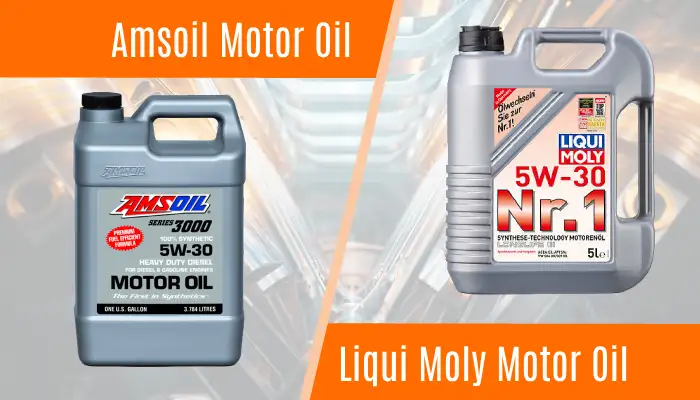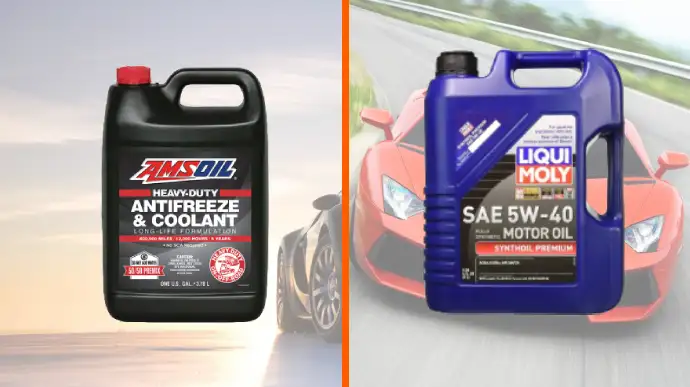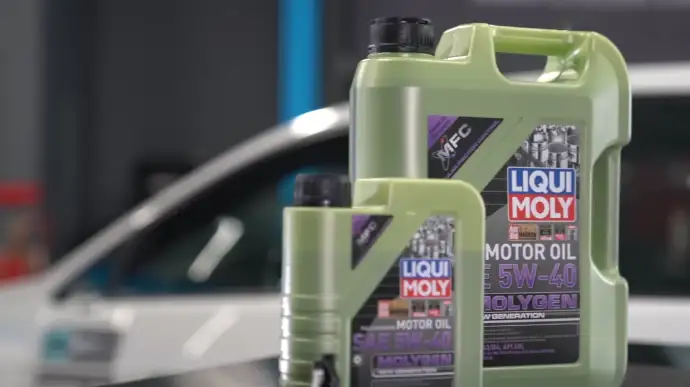Physical Address
304 North Cardinal St.
Dorchester Center, MA 02124
Physical Address
304 North Cardinal St.
Dorchester Center, MA 02124

Selecting the right motor oil for your vehicle is a decision that significantly impacts its performance, longevity, and overall well-being. In this age of automotive advancement, two prominent contenders have emerged: AMSOIL and Liqui Moly.
AMSOIL is exclusively a 100% synthetic motor oil, providing consistent molecular structure and superior protection. In contrast, Liqui Moly offers both synthetic and conventional options, providing versatility but potentially compromising protection.
In this comparison, we will explore the key differences between these motor oil brands, shedding light on their composition, performance, temperature range, and more. By the end of this exploration, you will be better equipped to make an informed decision tailored to your specific automotive needs.

If you’re trying to decide between Amsoil or Liqui Moly motor oil for your vehicle, there are several key differences to consider.
To understand the composition differences between Amsoil and Liqui Moly motor oil for your vehicle, you should know that Amsoil is a 100% synthetic oil.
This means that it’s engineered from chemically synthesized base oils, resulting in a uniform and consistent molecular structure. The advantage of this composition is enhanced performance and protection for your engine.
On the other hand, Liqui Moly offers a range of options, including synthetic and conventional oils. Their synthetic blend combines synthetic and conventional base oils, potentially offering a balance between performance and cost-effectiveness.
However, it’s important to note that this blend may not provide the same level of protection as a fully synthetic oil.
Amsoil is designed to withstand a wide temperature range, from -40 to 371.111 degrees Fahrenheit. This makes it suitable for use in various climates and conditions, offering adaptability and versatility.
Conversely, Liqui Moly operates in a narrower temperature range of 17.78 to 110 degrees Celsius. While this range covers most driving conditions, it may face challenges in extremely low or high-temperature environments.
AMSOIL’s synthetic formulation is designed to minimize friction, resulting in less wear on engine components. This reduction in friction can lead to improved fuel economy as the engine operates more efficiently.
Liqui Moly also offers good oil efficiency and protection, although it may not match the same level of efficiency provided by AMSOIL. However, if you prioritize a balance between performance and affordability, Liqui Moly’s oil efficiency may be sufficient.
When comparing the differences between Amsoil and Liqui Moly oils for your vehicle, it’s important to consider their varying viscosities. Viscosity refers to the oil’s resistance to flow, and it plays a crucial role in providing adequate lubrication and protection to your engine.
AMSOIL is engineered to have a higher viscosity, which means it’s thicker and clings better to the engine components, even under high-stress conditions. This results in longer-lasting protection and reduced wear on the engine.
Alternatively, Liqui Moly’s viscosity may not be as high as AMSOIL’s, which could result in reduced cling to the engine parts. However, this may not be a significant concern for less demanding driving conditions.
Consider the recommended oil change intervals for Amsoil or Liqui Moly motor oil to ensure optimal engine performance and longevity.
AMSOIL’s extended-drain synthetic motor oil offers significantly longer intervals before an oil change, lasting up to 25,000 miles or one year. This extended interval can be beneficial for reducing maintenance frequency and saving time and money.
Then again, Liqui Moly’s oil change intervals may vary depending on the specific product, driving conditions, and manufacturer’s recommendations. While Liqui Moly also offers motor oils with extended intervals compared to conventional oils, these intervals are often shorter than AMSOIL’s.
Both brands prioritize sustainability and have taken steps to reduce their environmental impact. But there are some small differences in approach.
AMSOIL focuses on responsible sourcing and manufacturing practices to minimize its ecological footprint. They’ve implemented measures to reduce waste, conserve energy, and control emissions throughout their production process.
On the other hand, Liqui Moly is committed to reducing its environmental impact and ensuring its products meet eco-friendly standards. They strive to develop biodegradable motor oils with low toxicity levels. And have worked to reduce their carbon emissions, saving both energy and money.
AMSOIL primarily focuses on synthetic motor oils but also offers specialized oils for various applications such as motorcycles and marine engines.
Their product range goes beyond just motor oils, with options for transmission fluids, gear lubes, fuel additives, and more. This comprehensive range allows you to find the right product for your needs.
Meanwhile, Liqui Moly offers a wider variety of products beyond motor oils. In addition to their range of high-quality motor oils, they also provide additives and cleaning products for the engine and other vehicle systems.
This broader product range makes Liqui Moly convenient for all your automotive maintenance needs.
AMSOIL not only meets industry standards set by organizations like ACEA and API, but it also surpasses tougher standards set by prestigious car manufacturers such as BMW, Mercedes-Benz, and Porsche. This demonstrates AMSOIL’s commitment to providing top-tier engine protection for vehicles.
On the other hand, Liqui Moly’s products also exceed industry standards, ensuring high-quality performance. However, Liqui Moly may not meet the more rigorous specifications set by certain premium car manufacturers.
Therefore, AMSOIL might be the preferred option if your vehicle requires adherence to these specific standards.
AMSOIL, originating in the United States in the 1970s, has a long-standing presence in North America as a provider of synthetic oil solutions. In contrast, Liqui Moly is a German company with a 50-year history, known for its European origins and reputation for quality and precision.
AMSOIL is often seen as more expensive than Liqui Moly, but its extended engine life and superior performance can justify this higher cost. AMSOIL’s advanced technology and high-quality ingredients make it worth the investment for those who prioritize long-term engine protection.
Meanwhile, Liqui Moly provides a more budget-friendly option without compromising on quality. While it may not offer the same level of performance and longevity as AMSOIL, Liqui Moly is still a reliable choice for car owners with tighter budgets.

One of the key reasons why LIQUI MOLY is so good is because it includes the liquefied solid lubricant MoS2. This unique ingredient helps to reduce wear, especially on older vehicle engines and improves the durability and function of the components.
MoS2 acts as a protective layer, forming a film on metal surfaces, which reduces friction and prevents direct metal-to-metal contact. This results in less wear and tear on the engine, leading to improved performance and longevity.
LIQUI MOLY motor oil is officially approved by BMW, ensuring that it meets the highest standards for performance and reliability in your vehicle. BMW, a renowned automobile manufacturer, has conducted rigorous testing to certify LIQUI MOLY as a trusted partner for their engines.
AMSOIL outperforms regular oil in multiple ways, making it a superior choice for your vehicle’s engine. One of the key advantages of AMSOIL is its ability to keep engine components significantly cleaner compared to regular oil.
In fact, it has been proven to keep engines 81% cleaner, which is five times cleaner than conventional oil. This impressive performance is attributed to AMSOIL’s superior resistance to the formation of deposits.
As tested using the TEOST 33C test (ASTM D6335), AMSOIL has shown exceptional resistance to deposit formation. It ensures that your engine stays cleaner for longer periods.
The presence of molybdenum in AMSOIL motor oil enhances its lubricating properties and provides long-lasting wear protection for your vehicle’s engine.
AMSOIL Signature Series 0W-20, 5W-20, and 5W-30 synthetic motor oils contain a high molybdenum disulfide (MoS2), a mineral known for its exceptional lubricating properties. This ingredient creates a protective layer, or film, on metal surfaces, reducing friction and minimizing wear and tear on engine parts.
Your choice between AMSOIL and Liqui Moly ultimately depends on your priorities and the demands of your vehicle. Each brand brings distinct advantages, making it a question of striking the right balance between performance, budget, and specific needs.
AMSOIL is a 100% synthetic powerhouse, offering superior protection, extended lifespan, and a broader temperature range. On the other hand, Liqui Moly is known for its synthetic blends and broad product line, making it an excellent choice for those seeking affordable automobile maintenance.
While AMSOIL excels in oil test results and efficiency, Liqui Moly’s accessibility is noteworthy, particularly in international markets. No matter which brand you choose, both are committed to the well-being of your vehicle.
Last update on 2026-01-25 / Affiliate links / Images from Amazon Product Advertising API